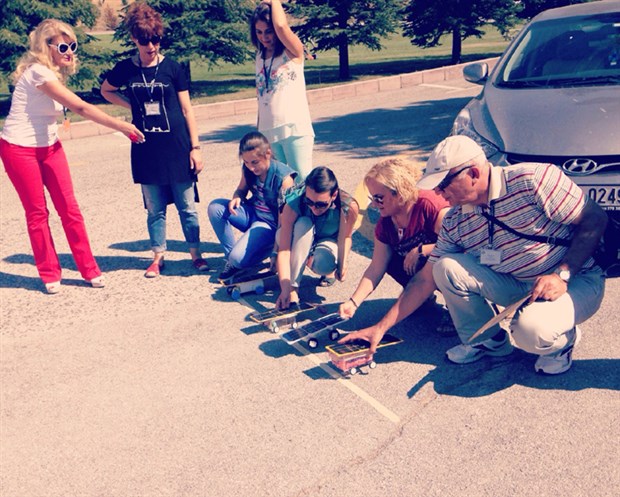Thanks to a TÜBİTAK grant received by the Graduate School of Education, there are 39 primary and middle school teachers in Turkey who are helping students promote sustainability in their communities. The 4005 Science and Society Innovative Education Practices grant was awarded to Dr. Armağan Ateşkan, along with her co-principal investigators Asst. Prof. Jennie Lane and Vis. Assoc. Prof. Erdat Çataloğlu.
The project involved two groups of teachers coming to the Bilkent campus to attend a five-day workshop: one group at the beginning of July and one at the end of August. The first group included teams of teachers from schools throughout Turkey, and the second group, teachers who work in various Ankara schools. All but one of the attendees teach in public schools.
During both workshops, teachers participated in a variety of activities. They were challenged to think of creative alternatives for handling materials normally thrown away. They focused less on recycling and more on clever ways to reuse and repurpose items such as bottle caps, teapots and confetti. The teachers were then asked to envision a sustainable future and analyze current consumption practices that may compromise the well-being of future generations. A local environmental lawyer, Emre Baturay Antınok, gave a presentation on how environmental issues affect social justice. The groups used all of this information to discuss their conceptions of sustainability. They then explored what sustainability means for education with guest speaker Sıla Sagun, a teacher at BLIS and a Bilkent graduate.
The teachers went on several field trips during the workshops. On campus, local birding expert and Bilkent graduate Asuman Gem led the teachers on a birdwatching trip to gain a better understanding of Turkey’s place in international bird migration routes. They also visited Bilkent Library and heard a presentation by librarian Hande Uçartürk on how a library can become “green.” Off campus, they visited the Mamak disposal site to learn how waste is managed in Ankara. In addition, Asst. Prof. Yasemin Afacan of the Department of Interior Architecture and Environmental Design prepared the teachers for a trip to Turkey’s first LEED platinum-certified building with a presentation on green building features and benefits.
An ongoing theme of the workshop was energy, exemplified when teachers gained hands-on experience by making solar ovens out of cardboard boxes and solar-powered model cars from recycled materials. In both cases, teachers worked in teams and struggled with trial and error. Nonetheless, they persevered, and their ovens were able to bake cookies, while their cars competed in a race in the parking lot (drawing attention from pedestrians and passing motorists). These activities involved teachers in using knowledge and skills related to science, technology, engineering and mathematics (STEM)—fields of study being promoted in schools throughout Turkey.
With the information and experience they gained from the workshop, the teachers have returned to their homes and are helping their students identify and investigate problems in their schools and communities. They will involve students in projects to address social and environmental issues that affect the well-being of their friends and families. To support their efforts, teachers will participate in an online forum to share ideas, resources and strategies. In the spring of 2016, the 39 teachers will return to the Bilkent campus to share their students’ projects and experiences.

